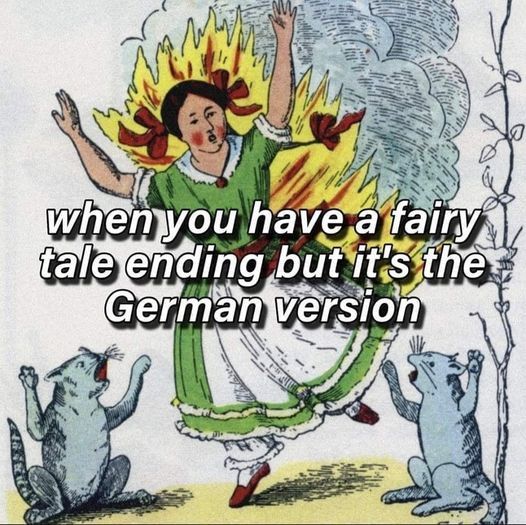#german fairy tales
Explore tagged Tumblr posts
Text

Anne Yvonne Gilbert, ''Snow White'', 2013
#Anne Yvonne Gilbert#british artists#snow white#the brothers grimm#german fairy tales#fairy tales#color illustration
517 notes
·
View notes
Text
I just watched a Rapunzel movie adaptation where the witch / Gothel was actually the good one and it made me think
Sirius who keeps Regulus in the tower to protect him, James who fell in love with Regulus and tries to free him from the tower, and Remus who helps James by distracting Sirius and falls in love with him
#regulus black#jegulus#marauders#james potter#james x regulus#sirius black#black brothers#jegulus fanfic#wolfstar#remus lupin#fairy tale au#german fairy tales#fairy tales#rapunzel
126 notes
·
View notes
Text
Do you know about Ludwig Bechstein? Well you should.
But do not worry: if you never heard of his name until now, it is perfectly normal. In a similar way to madame d'Aulnoy in France, Ludwig Bechstein was one of the great names and influential sources of the fairytale in Germany, but fell into complete obscurity due to being overshadowed in modern days by a contemporary (Charles Perrault for madame d'Aulnoy, the brothers Grimm for Bechstein).
Ludwig Bechstein was, just like the brothers Grimm, a German collector of fairytales (Märchen in German), and just like them he published an anthology of them. However, whereas the brothers Grimm started publishing their work in the early 1810s with re-editions later on, Bechstein published the first volume of his collection in 1845, and the second volume in 1856.
And here's the thing: Bechstein was MUCH, MUCH more well-known in Germany than the brothers Grimm, for the rest of the 19th century. While yes the brothers Grimm were a big success and a huge best-seller, Bechstein's fairytales were even more so. In fact his fairytales were THE de facto German fairytales of the 19th century - until the brothers Grimm's international celebrity (because their fairytales had crossed the Germanic frontiers into English and French-speaking countries, while Bechstein's had not) came back and made their own fairytales overshadow, and then completely eclipse/bury Bechstein's own fairytales.
Why is this important? Because Bechstein had in his collection several fairytales that overlapped with those of the Grimm: for example, as I will show above, both collections had an "Hansel and Gretel", and " Little Red Riding Hood". But while we know today the Grimm's version better, it was the Bechstein's version that the 19th century children knew about. And there is one big difference between the two sets of tales: while the brothers Grimm were obsessed with an "accuracy" of the stories (or what they believed was an "accuracy"), stitching stories together or writing them so as to create what felt like a traditional oral story as it would be told to you by a random German person, Bechstein allowed himself a more "literary approach". He never reached the level of an Andersen or a d'Aulnoy that would entirely rewrite a folk-tale into a long poetic epic... But he allowed himself to correct inaccuracies in the stories he collected, and to add personal details to make the story fit his tastes better, and to develop the dialogues into more than just nonsensical little rhymes, so while he kept short and simple stories like the Grimms, they definitively were more literary stories.
To give you two good examples of the differences, here are Bechstein's changes to the two stories I described above.
The main change within Little Red Riding Hood is Bechstein making the girl more intelligent and well-meaning than in the Grimms version, and the Wolf's deception even more devious. When the wolf tells the girl she could go pick up flowers and play outside of the path, like in the Grimm's tale, Bechstein's Riding Hood stops and asks roughly (not a quote I recap here): "Hey, mister Wolf, since you know so much about herbs and plants within this forest - do you know about any medicinal plant around, because if there is an herb that could heal my sick grandma, it would be super cool!". And the wolf jumps on the occassion, pretending he is a doctor - and he lists to her a whole set of flowers and herbs and berries she can pick up that would heal her grandmother... except all the plants he describes to her are poison, and the Wolf just mocks his intended victim. The joke also relies on the fact that all the plants he lists are named after wolves, with the beast convincing the girl it is because wolves are good and great things. (There's the wolf's-foot, the wolf's milk, the wolf's berries, the wolfswort - names which do correspond to real-like plants such as the spurge laurel or the aconit).
The ending is also slightly modified. The hunter is attracted to the grandma's house by hearing the unusually loud snoring of the wolf - he thinks something is wrong with the grand-mother, maybe she is dying, only to find the wolf in her place. He immediately grabs his rifle to kill it but then pause wondering "Hey, the little grandma is nowhere to be seen... and she was a scrawny woman... Better check if he did not eat her". And so he opens the wolf's belly (and the wolf is still asleep during all that, he really is a deep sleeper). When the humans decide to put stones in the wolf's belly, they explicitely reference in-universe the "Wolf and the seven goats" story, which gives them the idea. (Quite a fun and accurate detail since we know that the brothers Grimm attached the episode of the stone to the Little Red Riding Hood story by taking it from the "Wolf and the seven goats" one)
As for Hansel and Gretel, the witch is described differently from the Grimms (she is still a very, very old woman who has something wrong with her eyes, but she isn't red-eyed like the Grimm, rather she has "grass-green" rheumy eyes, and she has no cane or crutches, Bechstein rather insisting on her being a hunchback and havin a very, very large nose.) But the main difference occurs in the climax, which is very different from the Grimm.
The witch still tries to push Gretel in the oven, but she doesn't ask the girl to check if it is "hot enough". Rather she put bread in it to go with her Hansel-roast, and she asks the girl to check if the bread is brown yet. And Gretel is about to obey... when the snow-white bird that led them to the house reappears and warns her of an upcoming danger with human words. The girl immediately guesses the trick, and pushes the witch in the oven. Second big change: the "treasures" the children obtain are not the witch's, nor do they find it on their own. As they exit the house, the treasure literaly rains on them - because all the birds of the forest arrived and dropped the precious items on them while singing "For the crumbs of bread / Pearls an gems instead". As the children understand, the birds were grateful for what they believe was food offered to them (the bread crumbs) and reward the children with the treasure.
Oh yes and the mother (no stepmother here) doesn't die. Rather she and her husband are miserable in their house because they regret leaving their kids, so they are very happy when they return, and with the treasure they all are certain to never go hungry again. Happy end. (Because here the mother isn't a bad person like in the Grimm - she just really, REALLY was a desperate woman who didn't want to see her own children die before her eyes)
#little red riding hood#hansel and gretel#german fairytales#ludwig bechstein#bechstein fairytales#brothers grimm#grimm fairytales#grimm fairy tales#german fairy tales
69 notes
·
View notes
Text
Getting up for once before Kloppman hit his bunk with a stick hard enough to make him startle out of a fitful dream, Skittery got down from his bunk, looking at the other side of the bunkroom and finding Dutchy looking like the ceiling had personally offended him, Itey trying to disentangle himself from Snitch, and Snitch still pretty much asleep, thumb in his mouth.
"Ya know, one of these days the tailor will come and cut off your thumb.", he announced, banging on the bunk the three newsies were on.
While some of the others next to him like Snoddy looked shocked at what he'd just said, Dutchy started to laugh the hardest he'd ever seen him, grabbing for his glasses to see the aftermath of what Skittery had just told Snitch.
"W'n't f'nd me h're. 'S only 'n G'rmany.", mumbled Snitch, turning around and hitting Itey in the face with his feet, obviously accidentally because he did open his eyes wide, apologizing instantly.
"What does that have to do with his thumb?", Snoddy asked, still horrified from his top bunk next to them.
Skittery grinned, leaning over conspirationally. "The tailor is out to cut off boy's fingers when they suck their thumbs. He's been in the papes, just like the guy dipping people 'n ink because they're assholes, ya know?"
Snoddy did, obviously, not know, as nothing like that had been in the papes.
"Don't listen to a word he says, that's from some German fairytale book.", Dutchy interrupted Skittery's early morning fun.
"Don't tell him that-"
"Yeah, so you can tell 'im more 'bout how he'll starve if he doesn't eat his soup. Or how you'll crack open your head because you's always skittish and can't sit still at dinner."
Skittery rolled his eyes, taking his shirt and going to the washroom. "Can't let a guy have any fun, huh."
Fun fact those are all German children's stories from the Book "Der Struwwelpeter" and it also features fun like 'if you play with matches you will catch fire and your cats will cry over you' or 'if you're cruel to animals they'll bite back and you'll get hurt for being an asshole' and since I hc Snitch as German that tailor was his biggest fear as a kid.
Skittery knows it because he also grew up in Germany (half-German half-Armenian, last part bc of his actor) and Dutchy knows because he's, well, dutch, but lived close to the border.
The Tailor is from "Die Geschichte vom Daumenlutscher"
The guy dipping people in ink (for being racist to be exakt) is from "Die Geschichte von den Schwarzen Buben"
The one about eating soup is "Die Geschichte vom Suppen-Kaspar"
And lastly the one about moving too much is "Die Geschichte vom Zappel-Phillip". Skittery's Grandma always told him that one (I wonder why)
#newsies#92sies#1992sies#headcanons#newsies headcanons#it's silly#skittery newsies#snitch newsies#dutchy newsies#snoddy newsies#german fairy tales#look I had that in my hc list for so long I needed to write it at some point#let these boys shock each other with their respective horrifying bed time stories
14 notes
·
View notes
Text

4 notes
·
View notes
Text

26. Februar 2025 Heute ist wie jedes Jahr "Erzähl ein Märchen Tag" Von mir gibts das queere Märchen „Queer durch die Märchenwelt: Der Prinz, der mich liebte“.
Darin tauchen übrigens mehrere bekannte Märchenfiguren auf und das Ganze kommt mit einer Prise Humor gewürzt. Mehr über das Buch, auch eine Leseprobe:

#Erzähl ein Märchen Tag#Märchen#german fairy tales#German fiction#Tell a fairy tale day#buch tumblr#buchtumblr#lesen#leseliebe#bücher auf tumblr#queere bücher#queere literatur#Queer German Fiction#queer fairy tales#fairy tale#bücher#buch
0 notes
Text
Original old fairy tales. There are some creepy dark ones! And I loved them all! The grimmer, the better! Ghosts, spook, curses, nymphs, dead bodies, blood. Old fairy tales are the jam!!
im curious and no I’m serious about the poison apple books, they were so entertaining
7K notes
·
View notes
Text

Anne Yvonne Gilbert, 'Wicked Queen', 'Snow White'', 2013
#Anne Yvonne Gilbert#british artists#snow white#german fairy tales#the brothers grimm#color illustration
283 notes
·
View notes
Text
My favourite fairytale but make it Starchaser
It's called Die Sechs Schwäne = The six swans. Basically, there was a couple with 6 sons and the wife was pregnant. the sons caused a fire and instead of getting water, they were playing around. The father got angry and cursed them. They turned into swans. The wife died of grief. Years later, the daughter was grown and learned about her missing brothers. She set out to find them. They can only turn human once every 6 years and tell her how to break their curse: She has to remain completely silent while making six shirts out of stinging nettle. Then there's a whole love story with a prince and his awful mother.
Imagine: Regulus grows up an only child, only to find out that he used to have an older brother: Sirius. His mother cursed him to be a dog and he has been haunting the woods ever since.
Regulus sets out to find him and break his curse. To do this he has to be completely silent and not utter a single word or cry while sewing a shirt, trousers and a jacket out of stinging nettle.
He takes to the woods, to a field of nettle, and gets to work. The dog stays with him as his companion.
After a year or two, a handsome prince comes by and sees him taking a bath in a lake. He instantly falls in love. He is compelled by his beauty and intrigued by his mystery.
He watches the curious work with the nettles and although he doesn't understand what is going on, he sees that it is important to him and helps (hurting himself the entire time, which makes Regulus laugh soundlessly.)
Eventually, he wants to take Regulus home with him. He introduces him to his mother, the Queen, as his new groom.
The Queen doesn't want her son to marry a commoner, especially not a mute. She gives Regulus a chest of jewellery and coins and sends him away. Then, she claims Regulus stole it from her. James finds him again in the woods and asks about the jewels. Reg returns the chest and convinces him that he didn't steal them. James wants to take him home again. They also take the nettles and the dog this time.
James makes Regulus live in the palace. They are betrothed.
the Queen continues to make his life hell: She notices that he is very fond of dogs, so she has one killed right in front of him. She has all the nettle in the entire kingdom burned, but Regulus finds more in a church garden/cemetery (where the Queen's word doesn't hold power) and traverses the church grounds at night to collect the plants.
One day, James gets sick and the Queen says Regulus has poisoned him. He is locked in the dungeons. He manages to escape with Sirius's help, sneaks up to James's room and gives him self-made medicine to heal him. He does this for three nights. Then he is found when giving him the medicine and the Queen again accuses him of poisoning the prince - but James is well enough to see that Regulus healed him and didn't poison him.
They get married.
(In the fairytale the new princess then has a child. Let's skip an explanation for now and say, regulus and James have a baby)
Regulus loves his baby more than anything, and James loves them both. One night, while Regulus and the baby are alone and asleep, the Queen steals the child from its crib and gives it to a servant to kill it. She spreads blood over Regulus's hands and body.
Regulus is accused of killing the child. James doesn't know what to believe in his grief. The Dog tries to somehow convey to him that the Queen is at fault, but James doesn't understand. Regulus is incarcerated in the dungeons again to be burned at the stake for witchcraft - because of the dead baby, the nettles, the sewing, and walking around the church grounds at night.
While he is taken to the stake, he keeps working on the clothing. he is almost finished. As the pyre is ignited, Sirius appears. Regulus throws the clothing at him. The curse is broken, he turns into a man once again
(In the fairytale she couldn't finish one of the sleeves, so now one of her brothers has a permanent swan wing)
Sirius, who had witnessed what happened to the baby, accuses the queen of killing it and framing Regulus. James jumps to the pyre, frees his husband and rescues him.
The servant joins the crowd, holding a baby - it is Regulus's child, which he had refused to murder but hidden away, intending to return it to James once Regulus was dead.
With the evidence of Regulus's innocence and the testimony to the Queen's guilt in front of him, James takes her crown and sends her to the dungeons.
Regulus is finally able to speak again and James hears his husband's voice for the first time. He can finally say "I love you."
They all live happily ever after.
(Maybe this would be better with Wolfstar because the thought of making Euphemia an evil queen hurts me)
#regulus black#jegulus#marauders#james potter#james x regulus#sirius black#jegulus fanfic#black brothers#starchaser#sunseeker#german fairy tales#die sechs schwäne#sonntagsmärchen
56 notes
·
View notes
Text

Ludwig Bechstein's books were initially more popular than Grimm's in their competing era of publication (~1800s). I got these from a library book sale and this is what I went to look up. But here's what else I learned from Wikipedia:
*His mother was a German countess and his father was NOT THE COUNT. 👁️👄👁️
*His father was a French immigrant who mysteriously disappeared before his birth. 👻
*He grew up in the nearby orphanage in poverty, like, within sight of his mother's castle.
*His uncle Johann (mother's brother) was a respected scholar, we're talking: naturalist, forester, ornithologist (birds), entomology (insects), heptologist (amphibians) etc. In a time when the natural sciences were not necessarily divided between biology, zoology, botany, etc. The guy founded schools, classic wandering scholar archetype.
*Unkle Hans returns home and finds out he has a nine year old malnourished nephew living in the streets. Pissed (I assume). He adopts little Ludwig and immediately sends him to school (which would take a lot of catching up for NINE YEARS in these streets).
*Luddy boy studies philosophy, has connections with some big sponsors, apprentices as a pharmacist, ugh, moved to literature.
*Lutz gets a lifetime post as a Duke's librarian, where he happily writes romance novels, poetry, and published collections of folk tales.
*When he died they built a fountain (not a bench) in the English garden of the estate.
#movie please#movie plot#ludwig Bechstein#librarian lore#history#grimm's fairy tales#fairy tales#old books#book sale#german fairy tales
0 notes
Text

1 note
·
View note
Text
Here's how to write an authentic Grimm style fairytale, brought to you by a Certified German TM:
Forget everything Disney movies taught you, besides maybe Snowwhite, Cinderella, and Sleeping Beauty. But even those are on thin fucking ice. Also ignore modern fantasy literature conventions, especially Dungeons & Dragons type stuff.
Ideally only the protagonist or none of the characters ought to have names. And the names should either be really fucking ordinary, or some kind of epithet. Like, either that's a Franz or a Bramblesock, cause when Bramblesock was a child he lost a sock in a shrub of brambles. Everyone else is either the king, the grandma, or the carpenter.
The common types of protagonist: Regular working class guy who cons his way into a life of riches, poor downtrodden peasant who through hardworking kindness is granted salvation (usually via gaining riches), too pure too good for this world princess who can't catch a fucking break, too nasty too bratty for this world princess who gets taught a lesson in humility.
The characters are generally very one note and the only kind of character growth they can experience boils down to "maybe I shouldn't have been a dick, huh?"
The location is either as vague as possible or super fucking specific for no reason; either the story takes place literally nowhere or in the town of Buxtehude.
Animals and inanimate objects that can talk for no apparent reason and no one bats an eye at are always a great addition.
If you want to add any fantasy races, use giants (large, dumb brutes), dwarves (angry little guys who live in the wilderness and get really angry if you touch their beards), or gnomes (mischievous house spirits who might be helpful but watch out!), but never more than one of these. Fairies are rare and usually the "tall beautiful wise woman" type, not the small annoying pixie type. Dragons are very pointedly no-where to be found, those distinctly belong in sagas, which are their own distinct type of literature.
Weird moral of the story that either boils down to "be smarter than all the other fuckers", "good things happen to good people, bad things happen to bad people", or "don't upset the supernatural".
Random tidbits of gore that no one bats an eye at.
Witches eat children, if a mother gets more than single line dedicated to her she's evil, fathers are spineless and/or assholes who either die or come around in the end.
Ugly means evil, pretty means good. Except when it doesn't.
Optional: Repeated rhyming phrases and numbers. Seventh son of a seventh son kinda stuff. The numbers 3, 7, 12, and 13 in particular.
Ideally a 19th century scholar should be able to read some clumsy Germanic pagan wishful thinking into the story, no matter how big and obvious the Christian overtones are.
Optional: Start the story with "Once upon a time" and end it with "And if they didn't die, then they are still alive today."
#writing#fairy tales#fairytales#grimm's fairy tales#gebrüder grimm#brothers grimm#german stuff#writing advice
1K notes
·
View notes
Text
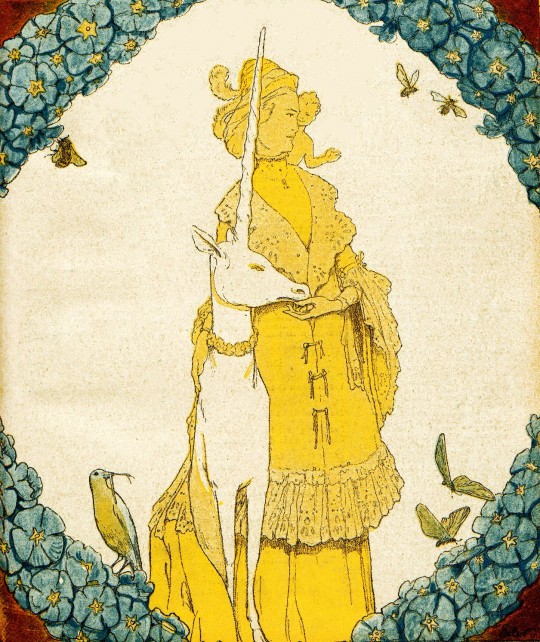
Illustration from Jugend Magazine by Fritz Erler (1909)
#fritz erler#art#illustration#jugendstil#1900s#1900s art#vintage art#vintage illustration#vintage#german art#german artist#magazine illustration#jugend#fairy tale#fairy tales#fairy tale art#unicorn#art nouveau#golden age of illustration#classic art
1K notes
·
View notes
Text

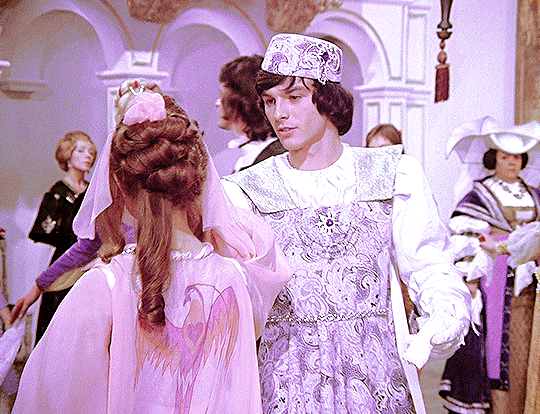
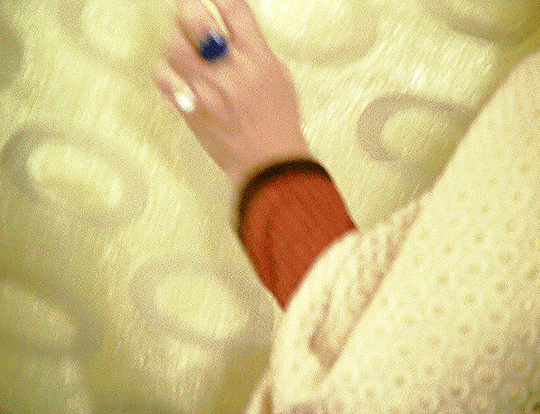
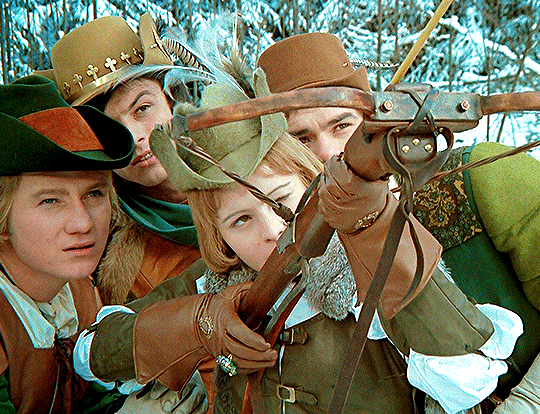

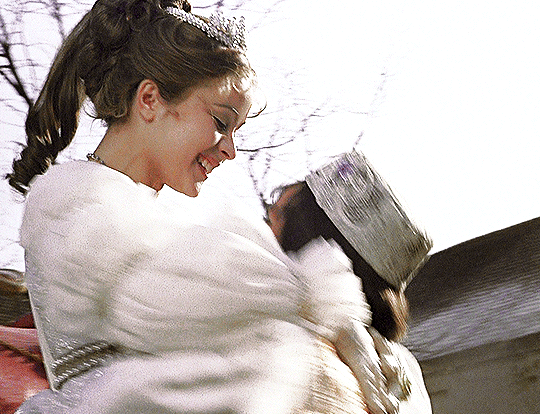
"I don't know if she's a Princess but she's beautiful. And somewhere here I lost her."
Tři oříšky pro Popelku / Drei Haselnüsse für Aschenbrödel / Three Wishes for Cinderella (1973) dir. by Václav Vorlíček.
#Tři oříšky pro Popelku#Drei Haselnüsse für Aschenbrödel#Three Wishes for Cinderella#Václav Vorlíček#Czechoslovak#Czech#German#Czechoslovak Cinema#Czech Cinema#Czechoslovak Fairy Tale#Czech Fairy Tale#My Gifs#GD
1K notes
·
View notes
Text

The Six Swans
Artist : Patrick James Lynch
#the six swans#les six cygnes#children's literature#fairy tale#children's books#fairy story#children's book#fairy tales#fairy#p. j. lynch#patrick james lynch#brothers grimm#the brothers grimm#les frères grimm#die sechs schwäne#german fairytales#german fairy tale#prince#wing#1993
992 notes
·
View notes
